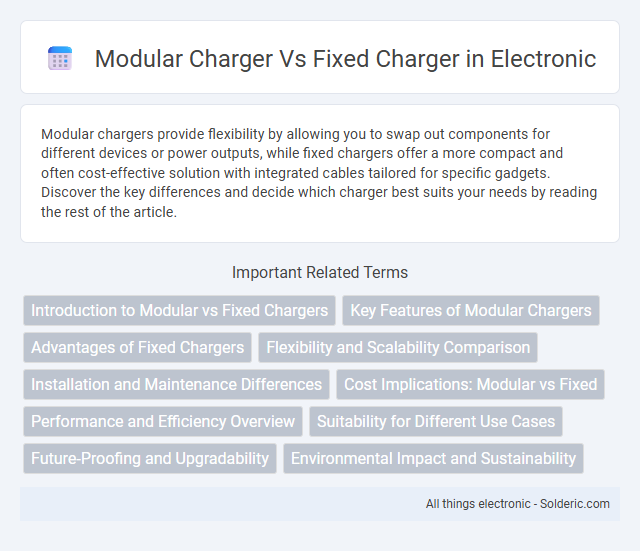Modular chargers provide flexibility by allowing you to swap out components for different devices or power outputs, while fixed chargers offer a more compact and often cost-effective solution with integrated cables tailored for specific gadgets. Discover the key differences and decide which charger best suits your needs by reading the rest of the article.
Comparison Table
| Feature | Modular Charger | Fixed Charger |
|---|---|---|
| Design | Interchangeable components for easy upgrades | Integrated, non-removable parts |
| Maintenance | Simple replacement of faulty modules | Requires full unit repair or replacement |
| Cost | Higher initial cost, lower upgrade expense | Lower upfront cost, costlier upgrades |
| Flexibility | Adapts to different devices and power needs | Limited to specific device or power rating |
| Portability | Often bulkier due to modular parts | Compact and lightweight |
| Durability | Possible wear at module connections | More robust, fewer connection points |
| Upgradeability | Easy to upgrade components individually | Needs full charger replacement |
Introduction to Modular vs Fixed Chargers
Modular chargers feature interchangeable components that allow for customization and easy replacement, enhancing flexibility and reducing electronic waste. Fixed chargers have a single integrated design offering simplicity and often a lower initial cost but lack adaptability. Choosing between modular and fixed chargers depends on your need for convenience, upgradeability, and long-term sustainability.
Key Features of Modular Chargers
Modular chargers offer interchangeable components that allow for easy upgrades, repairs, and customization according to device requirements. Their key features include enhanced portability through detachable cables, scalability with multiple output options, and improved energy efficiency tailored to varying power needs. These benefits make modular chargers a versatile and sustainable alternative to fixed chargers with integrated, non-replaceable parts.
Advantages of Fixed Chargers
Fixed chargers offer enhanced durability and reliability due to their integrated design, reducing the risk of connection failures or wear over time. Their compact and streamlined structure enables easier installation and consistent power delivery, minimizing maintenance needs. Fixed chargers often provide cost-effective solutions with improved safety features tailored for specific devices or environments.
Flexibility and Scalability Comparison
Modular chargers offer superior flexibility by allowing users to add or remove charging modules based on current power demands, ensuring efficient energy distribution and reducing downtime. Fixed chargers, with their static design, lack scalability, making them less adaptable to growing or fluctuating power requirements, which can lead to higher operational costs and inefficiencies. This scalability advantage of modular chargers supports seamless expansion in commercial and industrial applications, optimizing performance and cost-effectiveness.
Installation and Maintenance Differences
Modular chargers offer simplified installation with plug-and-play components that can be easily expanded or replaced, reducing downtime during setup and upgrades compared to fixed chargers. Maintenance is more efficient for modular systems due to interchangeable modules that allow quick swapping of faulty parts without disrupting the entire unit. Fixed chargers typically require more complex disassembly and longer service times, increasing operational interruptions and maintenance costs.
Cost Implications: Modular vs Fixed
Modular chargers typically have higher upfront costs due to interchangeable components but offer long-term savings through easier maintenance and upgrades, reducing replacement expenses. Fixed chargers usually have lower initial prices but may incur higher lifecycle costs because repairs often require full unit replacement. Businesses seeking scalability and cost efficiency often prefer modular designs to optimize total cost of ownership.
Performance and Efficiency Overview
Modular chargers offer enhanced performance and efficiency by allowing customizable power delivery tailored to specific device needs, reducing energy waste compared to fixed chargers. Fixed chargers operate at a constant output, often resulting in lower adaptability and potentially higher energy consumption under varying loads. Advanced modular charger designs also incorporate smarter thermal management, prolonging device lifespan and optimizing charging speed for diverse electronics.
Suitability for Different Use Cases
Modular chargers offer greater flexibility, making them ideal for users who require customizable power configurations for various devices or travel scenarios. Fixed chargers provide a streamlined, reliable solution well-suited for consistent, everyday charging needs with fewer compatibility concerns. Choosing between the two depends on whether adaptability or simplicity aligns better with the user's charging habits and device ecosystem.
Future-Proofing and Upgradability
Modular chargers offer superior future-proofing by allowing users to upgrade individual components as technology advances, reducing electronic waste and long-term costs. Fixed chargers lack this flexibility, often requiring complete replacement when newer standards or higher power demands emerge. Investing in modular designs supports evolving device compatibility and sustainable charging solutions.
Environmental Impact and Sustainability
Modular chargers significantly reduce electronic waste by allowing users to replace or upgrade individual components instead of discarding the entire unit, promoting sustainability in electronic device consumption. Fixed chargers typically contribute to higher environmental impact due to their non-replaceable parts, leading to increased landfill waste and resource depletion. Choosing a modular charger supports your commitment to eco-friendly technology by minimizing waste and extending the device's lifecycle.
modular charger vs fixed charger Infographic

 solderic.com
solderic.com